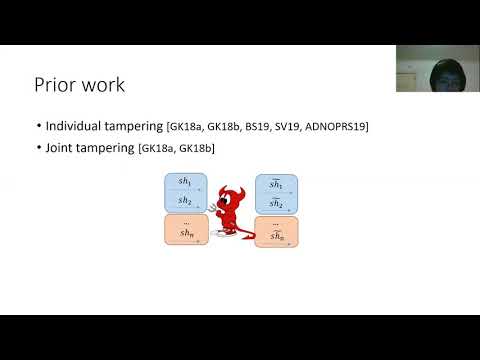CryptoDB
Non-Malleability against Polynomial Tampering
| Authors: |
|
|---|---|
| Download: |
|
| Presentation: | Slides |
| Conference: | CRYPTO 2020 |
| Abstract: | We present the first explicit construction of a non-malleable code that can handle tampering functions that are bounded-degree polynomials. Prior to our work, this was only known for degree-1 polynomials (affine tampering functions), due to Chattopadhyay and Li (STOC 2017). As a direct corollary, we obtain an explicit non-malleable code that is secure against tampering by bounded-size arithmetic circuits. We show applications of our non-malleable code in constructing non-malleable secret sharing schemes that are robust against bounded-degree polynomial tampering. In fact our result is stronger: we can handle adversaries that can adaptively choose the polynomial tampering function based on initial leakage of a bounded number of shares. Our results are derived from explicit constructions of seedless non-malleable extractors that can handle bounded-degree polynomial tampering functions. Prior to our work, no such result was known even for degree-2 (quadratic) polynomials. |
Video from CRYPTO 2020
BibTeX
@inproceedings{crypto-2020-30432,
title={Non-Malleability against Polynomial Tampering},
publisher={Springer-Verlag},
doi={10.1007/978-3-030-56877-1_4},
author={Marshall Ball and Eshan Chattopadhyay and Jyun-Jie Liao and Tal Malkin and Li-Yang Tan},
year=2020
}

